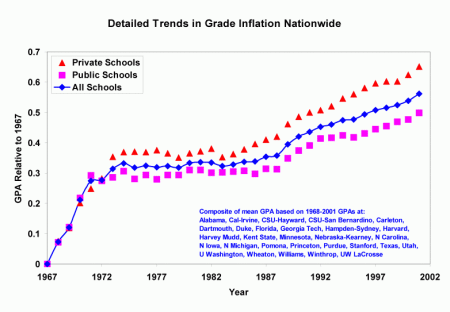Is Grade Inflation All Bad?
Grade inflation has not been constant through time. Mark Thoma at Economist’s View offers some hypotheses.

There are two episodes that account for most grade inflation. The first
is from the 1960s through the early 1970s. This is usually explained by
the draft rules for the Vietnam War. The second episode begins around
1990 and is harder to explain….My
study finds an interesting correlation in the data. During the time
grades were increasing, budgets were also tightening inducing a
substitution towards younger and less permanent faculty. I broke down
grade inflation by instructor rank and found it is much higher among
assistant professors, adjuncts, TAs, instructors, etc. than for
associate or full professors. These are instructors who are usually
hired year-to-year or need to demonstrate teaching effectiveness for
the job market, so they have an incentive to inflate evaluations as
much as possible, and high grades are one means of manipulating student
course evaluations.
But what are the consequences of grade inflation? A new study takes advantage of a tres bon experiment. In May of 1968 French students rioted, were suppressed by the police, but then joined by 10 million striking workers leading to a near revolutionary situation. To quiet things down many students that year were accepted to universities which in former and later years they would not have qualified for. What happened to those students?
Eric Maurin and Sandra McNally write:
We show that the lowering of thresholds at an early (and highly selective stage) of the higher education system enabled a significant proportion of students born between 1947 and 1950 (particularly in 1948 and 1949) to pursue more years of higher education that would otherwise have been possible. This was followed by a significant increase in their subsequent wages and occupational attainment, which was particularly evident for persons coming from a middle-class family background. Finally, returns were transmitted to the next generation on account of the relationship between parental education and that of their children.
The results are surprising but consistent with Bowen and Bok who argue that affirmative action did not harm minority students who were accepted at universities at which they would not have qualified based on grades alone.
I’m puzzled but not yet ready to retire my reputation as a tough grader – my best students deserve no less.
Comments are open.